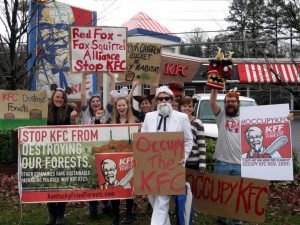 Dogwood Alliance
Dogwood Alliance
Dogwood Alliance has spent nearly two decades defending the forests and communities of the Southern United States from the devastating effects of industrial forestry. The organization was founded in 1996 in response to a major expansion of the US paper industry—fueled by controversial and unsustainable logging practices. In response to local and federal government inaction, Dogwood Alliance has independently instated a multi-stakeholder strategy for greening the US paper market.
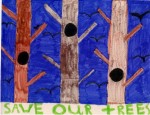 Some of the organizations most pivotal work has been conducted through their Paper Campaign; directed toward pressuring paper producers and their largest corporate custumers to transform their practices to protect endangered forests. Through grassroots action and strategic marketplace advocacy campaigns Dogwood Alliance has managed to re-direct the procedures of many key players in the office supply industry (Staples, AbitibiBowater, Georgia Pacific).
Some of the organizations most pivotal work has been conducted through their Paper Campaign; directed toward pressuring paper producers and their largest corporate custumers to transform their practices to protect endangered forests. Through grassroots action and strategic marketplace advocacy campaigns Dogwood Alliance has managed to re-direct the procedures of many key players in the office supply industry (Staples, AbitibiBowater, Georgia Pacific).
In 2007, Dogwood Alliance expanded their campaign to include paper packaging in music and cosmetic industries. Their newest project is addressing the use of post-consumer recycled packaging in the fast-food industry. Here, corporate giants such as McDonalds and KFC are used as leverage for widespread use of good practices in sustainable forestry. This approach is multi-faceted with youth organizing, widespread public messaging campaigns, and a focus on facilitating and publicizing high-profile corporate leaders adoption of sustainable paper policy.
The Harris and Francis Block Foundation has been excited to support the ever-evolving projects of Dogwood Alliance in its efforts to protect endangered forests; bringing an end to unsustainable forestry practices in the Southern United States and beyond. The Fast Food Packaging Campaign has received continued funding due to its effectiveness in engaging with a critical socio-environmental issue at all levels of impact, addressing the use of post-consumer recycled packaging in the fast-food industry. Here, corporate giants such as McDonalds and KFC are used as leverage for widespread use of good practices in sustainable forestry. This approach is multi-faceted with youth organizing, widespread public messaging campaigns, and a focus on facilitating and publicizing high-profile corporate leaders adoption of sustainable paper policy.
The Harris and Francis Block Foundation has been excited to support the ever-evolving projects of Dogwood Alliance in its efforts to protect endangered forests; bringing an end to unsustainable forestry practices in the Southern United States and beyond.
 Colorado Wildlife Federation
Colorado Wildlife Federation
Colorado Wildlife Federation is a longstanding conservation organization dedicated to the protection, sound management, and sustainable use of Colorado’s important wildlife habitats on federal public lands.
A major area of Colorado Wildlife Federation’s current advocacy work has been oriented toward oil and gas policy affecting South Park, Colorado. They have positioned themselves as a consistent voice of conservation opposing opportunistic oil and gas industrial leaders. The organization aims to halt all oil and gas land leases posing harm to wildlife habitats. They have firmly advocated for landscape level planning at the state level and successfully gathered concerned citizens and organizations around a revised leasing reform rubric.
Their plans for the future are rooted in grassroots organizing and media solicitation. Colorado Wildlife Federation will continue pushing local authorities to make ecologically responsible reforms. The organization is also taking effective steps to counteract the systematic efforts of the oil and gas industry to bypass environmental standards on land leases.
While this project is a recent addition to The Harris and Francis Block Foundation support circle, the foundation looks forward to Colorado Wildlife Federation’s efforts in furthering collective action promoting environmentally sustainable policy reforms in South Park, Colorado. The organization’s long-term and calculated commitment to protecting valuable natural resources makes it a primary candidate for continued foundation collaboration.
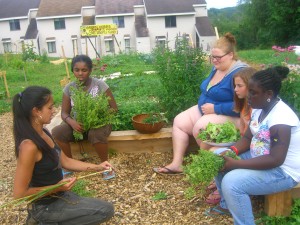 Foodworks at Two Rivers Center
Foodworks at Two Rivers Center
What our foundation appreciates about your work is that it is multi-faceted, has short and long term perspectives and is deeply rooted in a larger system of community support. How has your organization developed these visions and tapped into the networks necessary to expand your programming over the years?
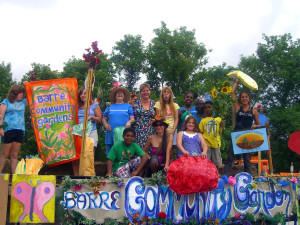 “For over 30 years we have been exploring the root causes of hunger and poverty and working to develop programs and initiatives that can empower young and old with the skills to change their lives. It all seems like having a dream and going for it–feeling the calling that this is your work and if you hold true to the vision –that learning the age old skills of food self sufficiency is the moral and practical thing to do. As a society we get lost and confused by hunger relief organizations who do good but fall short of making real and sustained change and unfortunately manage and maintain the problem, never really focusing on the root causes and the hands-on educational work necessary for people to change their life.
“For over 30 years we have been exploring the root causes of hunger and poverty and working to develop programs and initiatives that can empower young and old with the skills to change their lives. It all seems like having a dream and going for it–feeling the calling that this is your work and if you hold true to the vision –that learning the age old skills of food self sufficiency is the moral and practical thing to do. As a society we get lost and confused by hunger relief organizations who do good but fall short of making real and sustained change and unfortunately manage and maintain the problem, never really focusing on the root causes and the hands-on educational work necessary for people to change their life.
As for networks, we’ve worked with many groups around the country who share the same vision–for Food Justice and Food Sovereignty –realizing that the existing food system is unjust and maintains a 2 or 3 tier system–with the poorest quality food. So if you can afford local organic you shop at a co-op, most people shop at the industrial supermarkets and the poorest among us run out of food stamps in a week and depend on the charitable food system (un just) to make ends meet. One of the best networks we connected with was the Community Food Security Coalition, which was started by Andy Fisher a former ISE student. Unfortunately is just disbanded due to some confusing politics.”
Can you explain the goals of the Good Food-Good Medicine Program? How does this project fit into a wider effort to address the Vermont Statewide Farm to Plate Initiative?
“GOOD FOOD GOOD MEDICINE GOALS–
We are in our 6th year at Highgate Housing and 4th at Green Acres housing working on Food Justice with mostly multigenerational poverty women. This program teaches gardening, cooking, food preservation, herbalism, and nutrition to at-risk families at two section 8 housing projects in Barre, VT.
As for Farm to Plate– I would say this fits perfectly. Having worked with F2P from the beginning we are well connected to the plan and I would say acting as a local example of what Farm to Plate can look like. From our Farm to Table program–providing food aggregation and distribution to many disenfranchised sites such as senior meals, emergency food shelves, public schools, mental health programs, providing universal access to ALL. I would say we have pioneered work with food access and moved beyond just providing food, which has its limitations to providing food education giving people the hands on skills needed to know how to make use local food and turn them into nutritious meals for themselves and their families. The Challenge of F2P is to not give in to hunger relief and charity but to hold out to the bold and moral imperative that every one deserves the right to food access and education and if provided they will make healthy choices and good decisions. We can either maintain our existing and failing food system or rebuild a socially, morally and spiritually just food system that helps people care for their own food needs, increasing their own food security.”
Joseph, on a personal level, what has compelled you to devote your life’s work to food-access issues?
“Thanks for this question which is rarely asked!
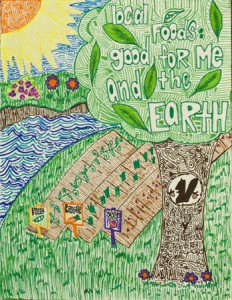 For me it was my childhood, growing up as the oldest son of 6 kids on a working poor dairy farm, learning the struggle of food, hunger and justice. In a way this has informed my life work by taking my life experience and turning it into my career. The quiet crisis of hunger and the shame one experiences lasts a lifetime with deep deep scars that inform and inspire your every step. We live in a world that focuses on efficiency, bottom lines and ultimate corruption. So many people will never know the plight, pain and overwhelming challenge of moving out of poverty into a world of self-sufficiency. The journey is long and the obstacles are endless. The safety net that used to protect and help people get a foothold are quickly slipping away. We seem to be returning to a robber barren/guilded age with an entrenched upper class and a growing lower class, filled with middle class fallout. This is a shameful, immoral and threatening time for our garden planet where the corporate elite has taken control of everything from our supreme court to our elected representatives, leaving little voice for the average person.
For me it was my childhood, growing up as the oldest son of 6 kids on a working poor dairy farm, learning the struggle of food, hunger and justice. In a way this has informed my life work by taking my life experience and turning it into my career. The quiet crisis of hunger and the shame one experiences lasts a lifetime with deep deep scars that inform and inspire your every step. We live in a world that focuses on efficiency, bottom lines and ultimate corruption. So many people will never know the plight, pain and overwhelming challenge of moving out of poverty into a world of self-sufficiency. The journey is long and the obstacles are endless. The safety net that used to protect and help people get a foothold are quickly slipping away. We seem to be returning to a robber barren/guilded age with an entrenched upper class and a growing lower class, filled with middle class fallout. This is a shameful, immoral and threatening time for our garden planet where the corporate elite has taken control of everything from our supreme court to our elected representatives, leaving little voice for the average person.
In short, Food Works at Two Rivers Center has taken on the moral imperative of food justice as our calling to ensure that everyone has equal access to locally grown, nutritious food, but more than that we see the need for food education to make sure people have the know-how power to grow their own food security. We will never let this vision go, as it is part of our humanity and part of our soul to care for each other with the skills of self reliance and determination. Our work is directly tied to the overall vision of social ecology helping to rebuild a culture for ecological sustainability.”
